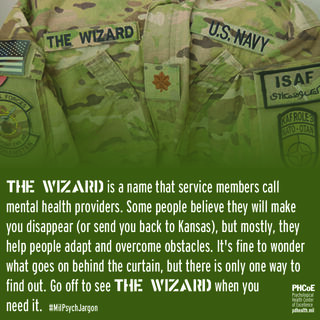Health
The Controversy of Being Called "The Wizard"
"Wizard" is a term often used by service members for military psychologists.
Posted May 31, 2022 Reviewed by Ekua Hagan
Key points
- Use of the term "Wizard" among service members has been documented as far back as the Vietnam War.
- Saying one is "off to see The Wizard" creates humor around going to see a military psychologist, which may make it easier, not harder, to go.
- While military psychologists do sometimes send people home, they also help people reclaim their lives and grow from their military experiences.
Over the years, I have observed many creative terms for military psychologists. Some are funny and adapted to the way the military names everyone. PsychO is a good depiction of this. On Navy ships, the titles of various officers are shortened, so the operations officer becomes the OpsO, the weapons systems officer becomes the Wizzo, so it only makes sense that the psychology officer becomes the PsychO.
These “terms of endearment” slip easily off the sailor’s tongue, but make policymakers addressing destigmatization uneasy. A shrink on board does not sound suitably helpful when abbreviated that way.

While different services and workplaces have their own terms, there is one in widespread use: The Wizard. The date of coinage is unknown, though it is documented at least back to Vietnam (Bey, 2006). But the meaning is seemingly clear. The Wizard can use his or her powers to make people disappear—from their commands and from the service in general. For service members who no longer want to be in the military, the belief is that The Wizard can get you sent home, without having to kill a witch, steal some shoes, and click that pair of ruby slippers three times. And while The Wizard connotation at first seems stigmatizing and derogatory, not everything is as it appears.
The "Good" Wizard
Just as in Oz or Middle-earth, there are good wizards and bad wizards. My first introduction to the concept of a “good” Wizard was at a holiday dinner early in my military career. It was a military Thanksgiving, at one of those overseas dinners where you temporarily create a new family out of random friends and strangers in order to celebrate the holiday with some semblance of normalcy.
I was sitting next to a Marine and normal conversation ensued, as in, “What do you do?” After I told him I was a psychologist, he said, “The Wizard just helped one of my friends who was having problems after Iraq.” What’s this? I thought. Marines believe The Wizard can use magical powers for good? Up until that point, I had not put two and two together to come up with the notion that Wizards might be perceived to have more powers than making people disappear. A good Wizard fixes people.
In a previous Marine command, I was called two things (to my face). In day-to-day business and workplace banter, I was The Psych. When there was an issue or a Marine was presenting for an interview, the Marines reverted to referring to me as The Wizard.
This seemed completely normal to them, and to ask them not to refer to me in that way would surely have resulted in all kinds of reverse effects and unintended consequences. They would figure out how to make a yellow brick road out of the passageway; a Cairn Terrier would be discovered roaming the halls; you get the idea.
Is the Term "Wizard" Harmful?
While one might say that service members are willing to joke around with The Psych and poke fun at being “off to see The Wizard,” is the term harmful overall? I say no. While one can argue that these terms are stigmatizing, conversely one can also argue that they put some humor in going to see a military psychologist, which could be hypothesized to make it easier, not harder, to go. The term is given in a mixture of humor, professional respect, and even a little amateur awe.
There is also an essential truth: Wizards have power and can heal. Many more people leave The Wizard to return to full duty than those who disappear. And seeing The Wizard can cause powerful and unexpected repercussions. The Wizard can give you back your heart, brain, and courage instead of just getting you back to Kansas.
So while it is true that sometimes military psychologists set things in motion that make people disappear or get people home, most of the time we help people reclaim their lives, grow from their military experiences, and give them what they need to remain fully functioning members of the military and society.
If service members believe a little magic is involved, it is a powerful placebo. Confidence that your doctor can help you and belief in his or her abilities to get you back in the fight are keys in treating any problem. The benefits of one’s own expectation of recovery are well described in the literature, a necessary component of treatment on which military psychologists must capitalize.
This is an updated post that appeared in The Military Psychologist in 2014. Copyright Carrie Kennedy.
References
Bey, D. (2006). Wizard 6: A Combat Psychiatrist in Vietnam. College Station, TX: Texas A&M University Press.




